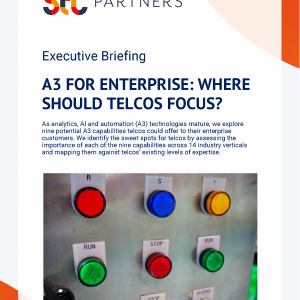Why the consumer IoT is stuck in the slow lane
£1,000.00 excl VAT
For uptake of Massive IoT connectivity to meet expectations in the B2C and B2B2C markets, telcos will need to dramatically improve coverage and simplify their propositions.
Description
Format: PDF filePages: 49 pagesCharts: 16Author: David PringlePublication Date: June 2021
Table of Contents
- Executive Summary
- Introduction
- Do consumers need Massive IoT?
- The role of eSIMs
- Takeaways
- Market trends
- IoT revenues: Small, but growing
- Consumer use cases for cellular IoT
- Amazon’s consumer IoT play
- Asset tracking: Demand is growing
- Connecting e-bikes and scooters
- Slow progress in healthcare
- Smart metering gains momentum
- Supporting micro-generation and storage
- Digital buildings: A regulatory play?
- Managing household appliances
- Technological advances
- Network coverage
- Conclusions: Strategic implications for telcos
Table of Figures
- Figure 1: IoT networks should be considered across multiple dimensions
- Figure 2: The characteristics of key consumer IoT use cases
- Figure 3: Trials and deployments of NB-IoT outside China
- Figure 4: NB-IoT is designed to provide much deeper coverage than its rivals
- Figure 5: Vodafone’s view of the relative strengths of LTE-M and NB-IoT
- Figure 6: eSIMs are very compact, which is ideal for small devices, such as sensors
- Figure 7: Cellular IoT connections are growing quickly (numbers in billions)
- Figure 8: Huawei highlights smart metering, smoke detectors and e-bike tracking
- Figure 9: Vodafone Business reports strong growth in IoT connections
- Figure 10: Transport-related use cases account for half of 2G IoT deployments in China
- Figure 11: Amazon Sidewalk is designed to pick up where Wi-Fi leaves off
- Figure 12: Digital Matter offers a broad selection of LTE-M/NB-IoT asset trackers
- Figure 13: Multiple stakeholders have an interest in e-bike and scooter tracking
- Figure 14: Value chain supporting the rollout of connected smoke alarms in China
- Figure 15: Igloo Home claims its locks are better than counterparts that rely on Wi-Fi
- Figure 16: How connectivity could support pay-as-you-go models for appliances
Technologies and industry terms referenced include: 2G, 4G, 5G, Amazon, apple, asset tracking, B2B, B2B2C, Business Model, China, China Mobile, Deutsche Telekom, DoCoMo, e-bikes, Ericsson, eSIM, Huawei, IoT, LoRa, LPWA, LTE-M, Massive IoT, NB-IoT, O2, security, Sigfox, Singtel, Smart Home, smart meters, Tesla, Verizon, Vodafone, water meter, wearbles, Wi-Fi


